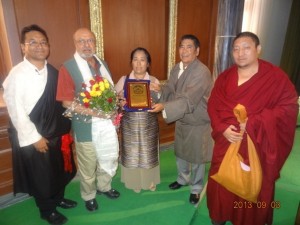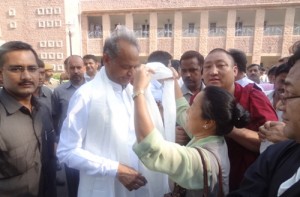
The south Indian Tibetan Parliamentary delegation with award winning Indian film director Shyam Benegal
Photo: tibet.net
The Solidarity Campaign is continuing its work, touring much of India, and recently lobbying governments from Andhra Pradesh, Goa, Karnataka, Kerala, Mumbai, Pondicherry and Tamil Nadu.
In late August the South Zone Tibetan Parliamentary Delegation met famous Bollywood actors and directors in Mumbai, including Ileana D’cruz, Lakshmi Rai, Anupam Kher and Vivek Oberoi. All of them expressed solidarity with Tibet; they pledged their continued support and said that they would bring up the issue of Tibet through their films. In Mumbai, Tibetan Parliament member Lobsang Yeshi told Indian politicians that the Peoples Republic of China had an anti-India agenda, and he urged them to take a more aggressive attitude in their relationship with China. In an attempt to foster solidarity between Indians and Tibetans he mentioned that all of the Tibetan policies towards China were inspired by the ancient Indian tradition of ahimsa, or non-violence, which is also a central tenet of Buddhism.

A member of the Tibetan Parliamentary delegation greets chief minister Ashok Gehlot in Rajasthan
Photo: tibet.net
The delegation has also visited North India and has met ministers in Rajasthan and Meghalaya. In Rajasthan, the Tibetan Parliamentary delegation called upon Chief Minister Gehlot, urging him to continue his support for the Tibetan cause. Mr Gehlot warmly greeted the delegation and expressed his sincere solidarity with the Tibetan people.
The efforts of the delegation are not in vain: on September 18, political leaders from Arunachal Pradesh sent a cross-party memorandum to Prime Minster Manmohan Singh urging him to open a dialogue with China and find a peaceful solution to the Tibet situation. The memorandum was keen to impress upon Singh the historic links between India and Tibet and, in line with Lobsang Yeshi’s statements, that promoting peace on the Tibetan plateau may be crucial for Indian security.
In Dharamshala, discussions have taken place to shape the policy and direction of the Solidarity Campaign. The 26th Meeting of the Task Force on Sino-Tibetan Negotiations, held earlier this month, discussed the dialogue process and possible amendments which could be made to it.




 Print
Print Email
Email